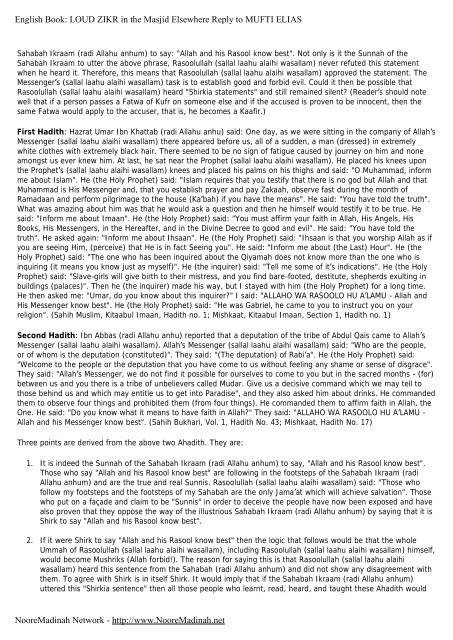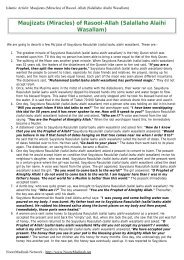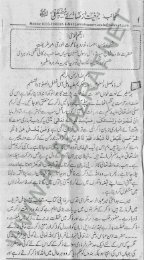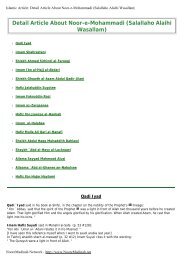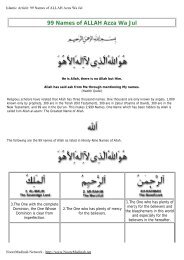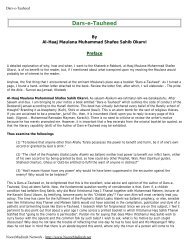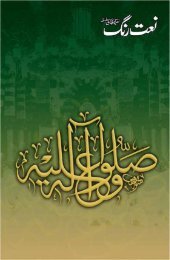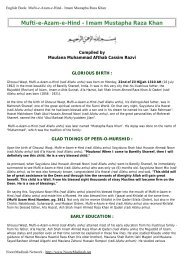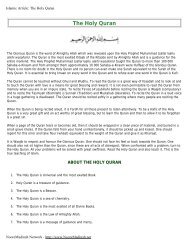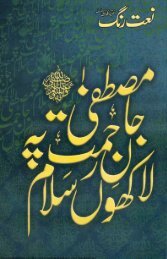LOUD ZIKR in the Masjid & Elsewhere & Reply to MUFTI ELIAS
LOUD ZIKR in the Masjid & Elsewhere & Reply to MUFTI ELIAS
LOUD ZIKR in the Masjid & Elsewhere & Reply to MUFTI ELIAS
You also want an ePaper? Increase the reach of your titles
YUMPU automatically turns print PDFs into web optimized ePapers that Google loves.
English Book: <strong>LOUD</strong> <strong>ZIKR</strong> <strong>in</strong> <strong>the</strong> <strong>Masjid</strong> <strong>Elsewhere</strong> <strong>Reply</strong> <strong>to</strong> <strong>MUFTI</strong> <strong>ELIAS</strong><br />
Sahabah Ikraam (radi Allahu anhum) <strong>to</strong> say: "Allah and his Rasool know best". Not only is it <strong>the</strong> Sunnah of <strong>the</strong><br />
Sahabah Ikraam <strong>to</strong> utter <strong>the</strong> above phrase, Rasoolullah (sallal laahu alaihi wasallam) never refuted this statement<br />
when he heard it. Therefore, this means that Rasoolullah (sallal laahu alaihi wasallam) approved <strong>the</strong> statement. The<br />
Messenger’s (sallal laahu alaihi wasallam) task is <strong>to</strong> establish good and forbid evil. Could it <strong>the</strong>n be possible that<br />
Rasoolullah (sallal laahu alaihi wasallam) heard "Shirkia statements" and still rema<strong>in</strong>ed silent? (Reader’s should note<br />
well that if a person passes a Fatwa of Kufr on someone else and if <strong>the</strong> accused is proven <strong>to</strong> be <strong>in</strong>nocent, <strong>the</strong>n <strong>the</strong><br />
same Fatwa would apply <strong>to</strong> <strong>the</strong> accuser, that is, he becomes a Kaafir.)<br />
First Hadith: Hazrat Umar Ibn Khattab (radi Allahu anhu) said: One day, as we were sitt<strong>in</strong>g <strong>in</strong> <strong>the</strong> company of Allah’s<br />
Messenger (sallal laahu alaihi wasallam) <strong>the</strong>re appeared before us, all of a sudden, a man (dressed) <strong>in</strong> extremely<br />
white clo<strong>the</strong>s with extremely black hair. There seemed <strong>to</strong> be no sign of fatigue caused by journey on him and none<br />
amongst us ever knew him. At last, he sat near <strong>the</strong> Prophet (sallal laahu alaihi wasallam). He placed his knees upon<br />
<strong>the</strong> Prophet’s (sallal laahu alaihi wasallam) knees and placed his palms on his thighs and said: "O Muhammad, <strong>in</strong>form<br />
me about Islam". He (<strong>the</strong> Holy Prophet) said: "Islam requires that you testify that <strong>the</strong>re is no god but Allah and that<br />
Muhammad is His Messenger and, that you establish prayer and pay Zakaah, observe fast dur<strong>in</strong>g <strong>the</strong> month of<br />
Ramadaan and perform pilgrimage <strong>to</strong> <strong>the</strong> house (Ka’bah) if you have <strong>the</strong> means". He said: "You have <strong>to</strong>ld <strong>the</strong> truth".<br />
What was amaz<strong>in</strong>g about him was that he would ask a question and <strong>the</strong>n he himself would testify it <strong>to</strong> be true. He<br />
said: "Inform me about Imaan". He (<strong>the</strong> Holy Prophet) said: "You must affirm your faith <strong>in</strong> Allah, His Angels, His<br />
Books, His Messengers, <strong>in</strong> <strong>the</strong> Hereafter, and <strong>in</strong> <strong>the</strong> Div<strong>in</strong>e Decree <strong>to</strong> good and evil". He said: "You have <strong>to</strong>ld <strong>the</strong><br />
truth". He asked aga<strong>in</strong>: "Inform me about Ihsaan". He (<strong>the</strong> Holy Prophet) said: "Ihsaan is that you worship Allah as if<br />
you are see<strong>in</strong>g Him, (perceive) that He is <strong>in</strong> fact See<strong>in</strong>g you". He said: "Inform me about (<strong>the</strong> Last) Hour". He (<strong>the</strong><br />
Holy Prophet) said: "The one who has been <strong>in</strong>quired about <strong>the</strong> Qiyamah does not know more than <strong>the</strong> one who is<br />
<strong>in</strong>quir<strong>in</strong>g (it means you know just as myself)". He (<strong>the</strong> <strong>in</strong>quirer) said: "Tell me some of it’s <strong>in</strong>dications". He (<strong>the</strong> Holy<br />
Prophet) said: "Slave-girls will give birth <strong>to</strong> <strong>the</strong>ir mistress, and you f<strong>in</strong>d bare-footed, destitute, shepherds exult<strong>in</strong>g <strong>in</strong><br />
build<strong>in</strong>gs (palaces)". Then he (<strong>the</strong> <strong>in</strong>quirer) made his way, but I stayed with him (<strong>the</strong> Holy Prophet) for a long time.<br />
He <strong>the</strong>n asked me: "Umar, do you know about this <strong>in</strong>quirer?" I said: "ALLAHO WA RASOOLO HU A’LAMU - Allah and<br />
His Messenger know best". He (<strong>the</strong> Holy Prophet) said: "He was Gabriel, he came <strong>to</strong> you <strong>to</strong> <strong>in</strong>struct you on your<br />
religion". (Sahih Muslim, Kitaabul Imaan, Hadith no. 1; Mishkaat, Kitaabul Imaan, Section 1, Hadith no. 1)<br />
Second Hadith: Ibn Abbas (radi Allahu anhu) reported that a deputation of <strong>the</strong> tribe of Abdul Qais came <strong>to</strong> Allah’s<br />
Messenger (sallal laahu alaihi wasallam). Allah’s Messenger (sallal laahu alaihi wasallam) said: "Who are <strong>the</strong> people,<br />
or of whom is <strong>the</strong> deputation (constituted)". They said: "(The deputation) of Rabi’a". He (<strong>the</strong> Holy Prophet) said:<br />
"Welcome <strong>to</strong> <strong>the</strong> people or <strong>the</strong> deputation that you have come <strong>to</strong> us without feel<strong>in</strong>g any shame or sense of disgrace".<br />
They said: "Allah’s Messenger, we do not f<strong>in</strong>d it possible for ourselves <strong>to</strong> come <strong>to</strong> you but <strong>in</strong> <strong>the</strong> sacred months - (for)<br />
between us and you <strong>the</strong>re is a tribe of unbelievers called Mudar. Give us a decisive command which we may tell <strong>to</strong><br />
those beh<strong>in</strong>d us and which may entitle us <strong>to</strong> get <strong>in</strong><strong>to</strong> Paradise", and <strong>the</strong>y also asked him about dr<strong>in</strong>ks. He commanded<br />
<strong>the</strong>m <strong>to</strong> observe four th<strong>in</strong>gs and prohibited <strong>the</strong>m (from four th<strong>in</strong>gs). He commanded <strong>the</strong>m <strong>to</strong> affirm faith <strong>in</strong> Allah, <strong>the</strong><br />
One. He said: "Do you know what it means <strong>to</strong> have faith <strong>in</strong> Allah?" They said: "ALLAHO WA RASOOLO HU A’LAMU -<br />
Allah and his Messenger know best". (Sahih Bukhari, Vol. 1, Hadith No. 43; Mishkaat, Hadith No. 17)<br />
Three po<strong>in</strong>ts are derived from <strong>the</strong> above two Ahadith. They are:<br />
1. It is <strong>in</strong>deed <strong>the</strong> Sunnah of <strong>the</strong> Sahabah Ikraam (radi Allahu anhum) <strong>to</strong> say, "Allah and his Rasool know best".<br />
Those who say "Allah and his Rasool know best" are follow<strong>in</strong>g <strong>in</strong> <strong>the</strong> footsteps of <strong>the</strong> Sahabah Ikraam (radi<br />
Allahu anhum) and are <strong>the</strong> true and real Sunnis. Rasoolullah (sallal laahu alaihi wasallam) said: "Those who<br />
follow my footsteps and <strong>the</strong> footsteps of my Sahabah are <strong>the</strong> only Jama’at which will achieve salvation". Those<br />
who put on a façade and claim <strong>to</strong> be "Sunnis" <strong>in</strong> order <strong>to</strong> deceive <strong>the</strong> people have now been exposed and have<br />
also proven that <strong>the</strong>y oppose <strong>the</strong> way of <strong>the</strong> illustrious Sahabah Ikraam (radi Allahu anhum) by say<strong>in</strong>g that it is<br />
Shirk <strong>to</strong> say "Allah and his Rasool know best".<br />
2. If it were Shirk <strong>to</strong> say "Allah and his Rasool know best" <strong>the</strong>n <strong>the</strong> logic that follows would be that <strong>the</strong> whole<br />
Ummah of Rasoolullah (sallal laahu alaihi wasallam), <strong>in</strong>clud<strong>in</strong>g Rasoolullah (sallal laahu alaihi wasallam) himself,<br />
would become Mushriks (Allah forbid!). The reason for say<strong>in</strong>g this is that Rasoolullah (sallal laahu alaihi<br />
wasallam) heard this sentence from <strong>the</strong> Sahabah (radi Allahu anhum) and did not show any disagreement with<br />
<strong>the</strong>m. To agree with Shirk is <strong>in</strong> itself Shirk. It would imply that if <strong>the</strong> Sahabah Ikraam (radi Allahu anhum)<br />
uttered this "Shirkia sentence" <strong>the</strong>n all those people who learnt, read, heard, and taught <strong>the</strong>se Ahadith would<br />
NooreMad<strong>in</strong>ah Network - http://www.NooreMad<strong>in</strong>ah.net


